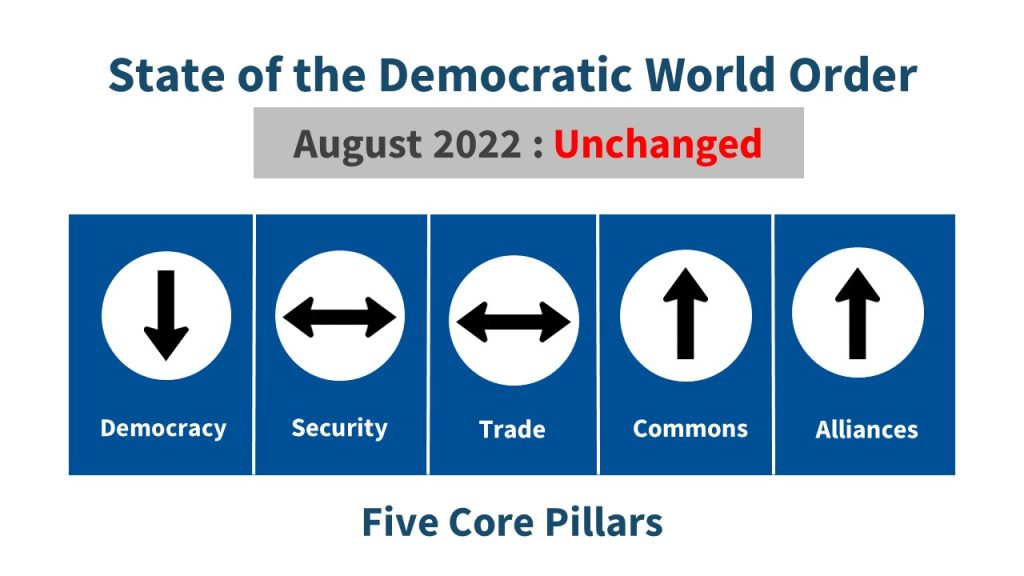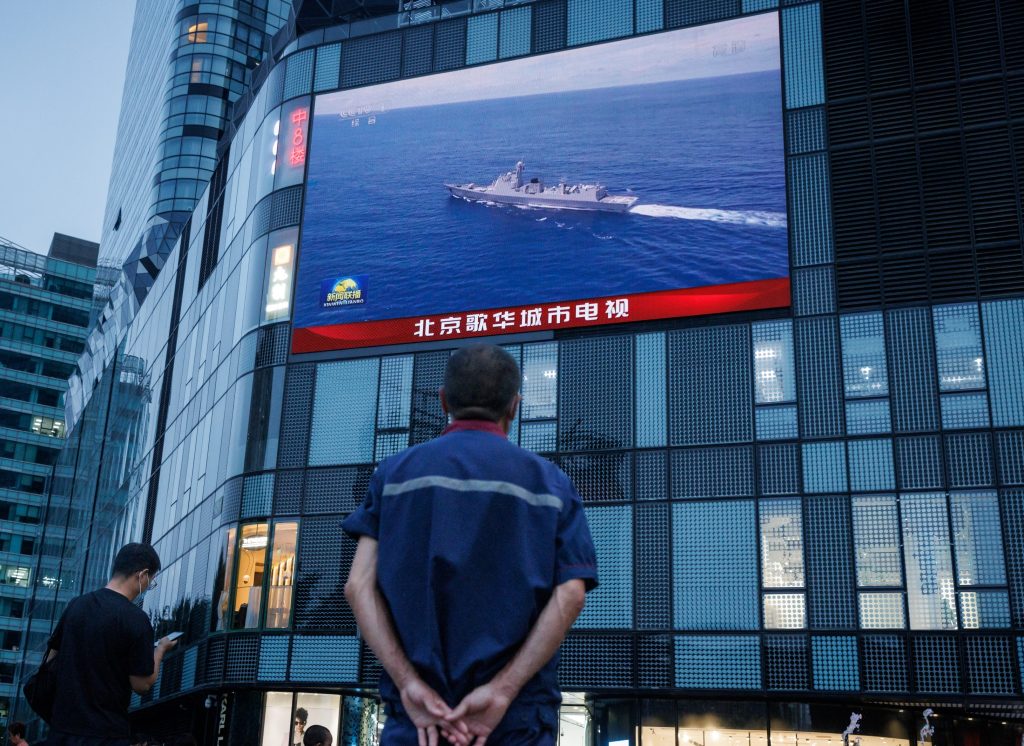Reshaping the order
This month’s topline events
China Surrounds Taiwan. In response to a US congressional visit to Taiwan led by House Speaker Nancy Pelosi, China launched three days of intensive military exercises around the island, involving live-fire drills, ballistic missile launches, fighting jet swarms, and warships crossing the Taiwan Strait midline. The Biden administration called China’s actions “provocative” and “irresponsible,” and the G7 issued a statement criticizing China’s “threatening actions.” Beijing’s ambassador to the United States warned against additional US arms sales and official travel to Taiwan, as US warships later passed through the strait as part of the Navy’s ongoing freedom of navigation operations in the Indo-Pacific.
- Shaping the order. Taiwan has become a flashpoint in the strategic competition between leading democracies and rival autocracies to shape the future of the global order. Chinese president Xi Jinping’s aggressive response to Pelosi’s visit seemed intended to demonstrate Beijing’s resolve and suggests China may be seeking to regularize its military presence around Taiwan in preparation for a possible future attack. But as Chinese forces concluded their maneuvers, any potential confrontation over the island appears unlikely for now.
- Hitting home. A Chinese military attack on Taiwan – which is among the world’s ten leading exporters – could have catastrophic implications for the US and global economy.
- What to do. The US and its allies should continue to defend the right of lawmakers and officials to visit Taiwan, an important democratic partner. While maintaining its “one China” policy, Washington should bolster security assistance to the island and strengthen efforts to deter any potential future invasion.
Ukraine Goes on Offense. Ukrainian forces launched their first major counter-offensive since the war began, aiming to retake control of Kherson in the south of the country, while embarking on a campaign of attacks on key military targets inside Crimea. As Russian advances in the Donbas were halted, Russian president Vladimir Putin issued a decree aimed at boosting the size of Russian military forces. Separately, the Kremlin imposed intermittent shutdowns of the Nord Stream One gas pipeline in an apparent bid to sow divisions among the US and European allies.
- Shaping the order. With Russian forces on the defensive, the tide appears to be shifting in Ukraine’s favor, though the duration of the conflict and its ultimate outcome remain far from certain. As Moscow begins to lose ground, the risk that it may resort to WMD, or seek to cause radiation leaks from the Zaporizhzhia nuclear power plant, remains significant. But despite the Kremlin’s threats to cut off oil and gas supplies to Europe, the US and its allies remain steadfast and united on support for Ukraine and sanctions against Russia.
- Hitting home. As it faces continued setbacks in Ukraine, Russia will likely be in a weaker position to undermine the rules-based order that has benefitted Americans in so many ways.
- What to do. The Biden administration should continue to provide Ukrainian forces with the weapons systems they need to push Russian forces out of the country, while coordinating closely with NATO and Asia-Pacific allies to maintain a unified front on Russia sanctions.
US Acts on Climate Change. Congress passed the most significant climate legislation in US history, providing $370 billion in clean energy and climate mitigation investments over the next 10 years. The ambitious effort will help the US meet its pledge to cut greenhouse gas emissions in half by 2030, and brings the nation in line with the EU and other leading democracies that have made commitments to significantly reduce emissions over the next decade.
- Shaping the order. Coming less than two years after the US officially pulled out of the Paris climate agreement, the congressional action bolsters US leadership on a key global challenge, while enhancing America’s credibility with allies and partners more broadly. The new investments in clean energy could help ameliorate the impacts of climate change, but further action will be required by the US and other nations to meet their commitments at last year’s global climate summit.
- Hitting home. The bill provides subsidies and other incentives to US companies that take steps to lower their emissions or engage in carbon sequestration, as well as tax credits and rebates to consumers who buy electric vehicles or install solar panels.
- What to do. Building on this momentum, Washington should seek to launch a new economic framework aimed at ensuring that the free world leads the development of clean energy manufacturing and innovation and avoids becoming dependent on China for its future energy needs.
Quote of the month
“Today the world faces a choice between democracy and autocracy. America’s determination to preserve democracy, here in Taiwan and around the world, remains ironclad.”
– US House Speaker Nancy Pelosi, August 2, 2022

State of the Order this month: Unchanged
Assessing the five core pillars of the democratic world order
Democracy (↓)
- Thousands of Brazilians joined nationwide rallies in “defense of democracy,” amid continuing attacks from President Jair Bolsonaro on the country’s voting system and on Supreme Court justices, as polls show Bolsonaro trailing former president Lula da Silva ahead of the October 2 presidential election.
- Kenyan opposition leader Raila Odinga refused to concede the presidential election to Deputy President William Ruto, the declared winner, but the election was widely hailed as one of the most peaceful and transparent elections in Kenya’s history.
- Pakistan police charged former Prime Minister Imran Khan under anti-terror laws for making threats against a judge and other officials after Khan accused authorities of torturing his close aide. Khan vowed to defend his actions in court while organizing mass political rallies across the country.
- Overall, the democracy pillar was weakened.
Security (↔)
- China launched three days of intensive military exercises in the waters and airspace around Taiwan, some less than 20 kilometers from the island, including ballistic missiles that were reportedly fired over the island.
- Ukrainian forces launched a counteroffensive in the southern Kherson region and embarked on a campaign of attacks inside Crimea, as the tide of the war appeared to be turning in Ukraine’s favor.
- US drone strikes killed Al-Qaeda leader Ayman al-Zawahiri, Osama bin Laden’s deputy and a key figure in the planning of the 9/11 attacks, who was located in Kabul despite the Taliban’s claims that it was not harboring foreign fighters.
- Russia obtained dozens of Iranian combat drones to help boost its war effort against Ukraine and launched an Iranian satellite that may allow Moscow to monitor troop movements in Ukraine – moves that underscored deepening security ties between Moscow and Tehran.
- On balance, the security pillar was unchanged.
Trade (↔)
- The US and Taiwan agreed to launch formal talks on a new economic partnership – the US-Taiwan Initiative on 21st Century Trade – aimed at deepening trade and investment between the two economies.
- The EU, South Korea, and other US allies expressed concern about discriminatory treatment in the climate legislation passed by Congress, including tax incentives for electric vehicles that are limited to those made only in North America.
- On balance, the trade pillar was unchanged.
Commons (↑)
- President Joe Biden signed flagship legislation into law that includes $370 billion to fight climate change, putting the US on track to lower greenhouse gas emissions by up to 44% by 2030.
- U.S. warships sailed through Taiwan Strait for the first time since Pelosi’s visit to the island, in a move intended to counter China’s maritime claims and assert freedom of navigation in the Indo-Pacific.
- Overall, the global commons pillar was strengthened.
Alliances (↑)
- G7 allies joined the United States in criticizing China’s “threatening actions” around Taiwan and asserting there was no justification for using Pelosi’s visit as a “pretext for aggressive military activity.”
- The US Senate voted overwhelmingly to approve a treaty expanding NATO to include Finland and Sweden, amid Russia’s continued assault on Ukraine.
- Overall, the alliance pillar was strengthened.
Strengthened (↑)________Unchanged (↔)________Weakened (↓)
What is the democratic world order? Also known as the liberal order, the rules-based order, or simply the free world, the democratic world order encompasses the rules, norms, alliances, and institutions created and supported by leading democracies over the past seven decades to foster security, democracy, prosperity, and a healthy planet.
This month’s top reads
Three must-read commentaries on the democratic order
- Fiona Hill and Angela Stent, in Foreign Affairs, contend that Putin aims to preside over a new union composed of Russia, Ukraine, Belarus, and perhaps the northern part of Kazakhstan, and establish a sphere of control in Eurasia that the West will be forced to accept.
- Alexander Gabuev, also in Foreign Affairs, writes that Russia’s increasing dependence on China will be a tremendous asset in Beijing’s competition with Washington.
- Adrian Wooldridge, in Bloomberg, makes the case for friendshoring – shifting supply chains from hostile countries to friendly ones – as a way to prevent hostile states from gaining the ability to disrupt the West.
Action and analysis by the Atlantic Council
Our experts weigh in on this month’s events
- Matthew Kroenig and Barry Pavel, in Newsweek, offer concrete steps the US and its allies and partners can take to strengthen deterrence in the Taiwan Strait and bolster the free world’s economic and diplomatic ties to Taiwan.
- Dan Fried, in the New Atlanticist, writes on why US global leadership – from WWII, to the Cold War, to the war in Ukraine and NATO expansion – continues to survive domestic partisanship.
- Matthew Kroenig, in Foreign Policy, argues that according to international relations theory, great-power conflict between the US, China, and Russia is coming and unlikely to be peaceful.
- Melinda Haring, in the Atlantic Council’s UkraineAlert, outlines six surprising developments since the war in Ukraine began.
__________________________________________________
The Democratic Order Initiative is an Atlantic Council initiative aimed at reenergizing American global leadership and strengthening cooperation among the world’s democracies in support of a rules-based democratic order. Sign on to the Council’s Declaration of Principles for Freedom, Prosperity, and Peace by clicking here.
Ash Jain – Director for Democratic Order
Dan Fried – Distinguished Fellow
Jeffrey Cimmino – Associate Director
Danielle Miller – Program Assistant
Otto Hastrup Svendsen – Georgetown Student Researcher
If you would like to be added to our email list for future publications and events, or to learn more about the Democratic Order Initiative, please email AJain@atlanticcouncil.org.
